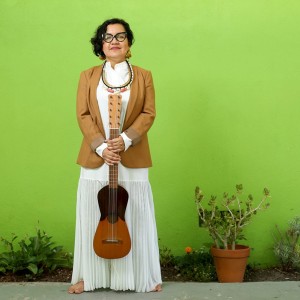Bio

**UPDATE**
As a Chicana artivista, music and the power it invokes is at the heart of my practice as a musician, scholar, and activist. Fandango and collective songwriting as empowering methodologies have helped me and members of my communities summit into new forms of analysis and thus action. Music as a tool of dialogue. Music and its respective dance as a participatory practice are generative and artivistas like myself see these and similar practices as part of the lexicon of social justice movement. Like most fellows I want to acknowledge that I have never learned, worked and or played music in a vacuum. That my intellectual and physical labor, passion for music and activism was nurtured in local and transnational communities. I am indebted to them as well as my family, mentors, teachers, and maestr@s in the US, Veracruz and Chiapas, Mexico. Finally, I want to thank my partner in life, music and social justice struggle, Quetzal Flores for all that he has done for me and our son Sandino. From music, organizing, dialogue to child rearing I could not have accomplished as much as I have in my professional and music life without his guidance, love and support.
– Martha (El Sereno, October 2022)
***
Martha Gonzalez is a Chicana artivista (artist/activist) musician, feminist music theorist and Associate Professor in the Intercollegiate Department of Chicana/o Latina/o Studies at Scripps/Claremont College. A Fulbright (2007-2008), Ford (2012-2013) and Woodrow Wilson Fellow (206-2017), her academic interests have been fueled by her own musicianship as a singer/songwriter and percussionist for Grammy Award (2013) winning band Quetzal.
Quetzal has made considerable impact in the Los Angeles Chicano music scene. The relevance of Quetzal’s music and lyrics have been noted in a range of publications, from dissertations to scholarly books. As a result, Quetzal have represented Chicano in spaces such as the U.S. Library of Congress and The Kennedy Center in September of 2011 as a part of their “Homegrown” music series. Furthermore, the traveling exhibit “American Sabor: Latinos in U.S. Popular Music” sponsored by the Smithsonian Institute, featured Quetzal as leaders and innovators of Chicano music. As a musician, Gonzalez has collaborated, and/or toured with artist such as Los Lobos, Los Van Van, Jackson Brown, Susana Baca, Perla Batalla, Jaguares, Ozomatli, Jonathan Richman, Los Muñequitos de Matanzas, iCubanismo!, Taj Mahal, Tom Waits, Los Super Seven, Lila Downs, Raul Malo, Rick Treviño, Son De Madera, Relicario, Chuchumbe Charanga Cakewalk, The B-side Players, Teatro Campesino, Aloe Blacc, Maya Jupiter, and Laura Rebolloso. Quetzal’s latest release is titled “The Eternal Get Down” on Smithsonian Folkways (2016) and they are currently working on “Puentes Sonoros” (Sonic Bridges) also on Folkways (estimated release, spring of 2019).
Gonzalez along with her partner Quetzal Flores has been instrumental in catalyzing the transnational dialogue between Chican@s/Latin@ communities in the U.S and Jarocho communities in Veracruz, Mexico. Remaining active within the community, Gonzalez has been implementing the collective songwriting method in correctional facilities in schools, prisons, detention centers and college classrooms throughout California, Arizona and Seattle WA. She has won numerous teaching awards and is currently serving her third year as an ASU Gammage resident artist. In these ways her performance back ground, music pedagogy and transnational music movement experience has influenced Gonzalez’s scholarship.
The promise of Gonzalez’s scholarly work has been recognize through publication in various academic presses. Most recently, “ ‘Coyote Hustle’: Street Vendors and Gentrification in Boyle Heights” was published on Kalfou (Spring 2017) and “Caminos y Canciones in the City of Los Angeles” was published in The Tide Was Always High: The Music of Latin America in Los Angeles edited by Josh Kun (University of California Press).
Most recently, and as a testament to the body of music and community work Gonzalez has accomplished on and off the stage, in the summer of 2017 Gonzalez’s tarima (stomp box) and zapateado dance shoes were acquired by the National Museum of American History. Professor Gonzalez’s first book manuscript, Chican@ Artivistas: Music, Community and Transborder Tactics in East Los Angeles will be out on UT Austin Press in the fall of 2020. Gonzalez lives in Los Angeles with her husband Quetzal and their 15 year-old son-Sandino.
Contact me here.
Download my CV here.

